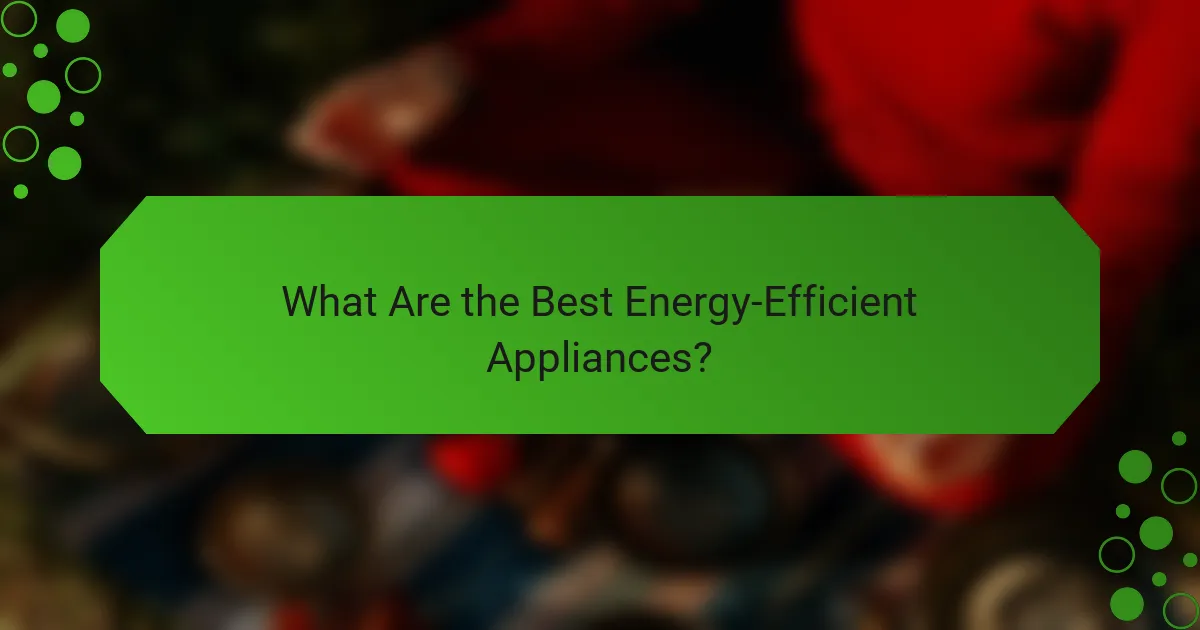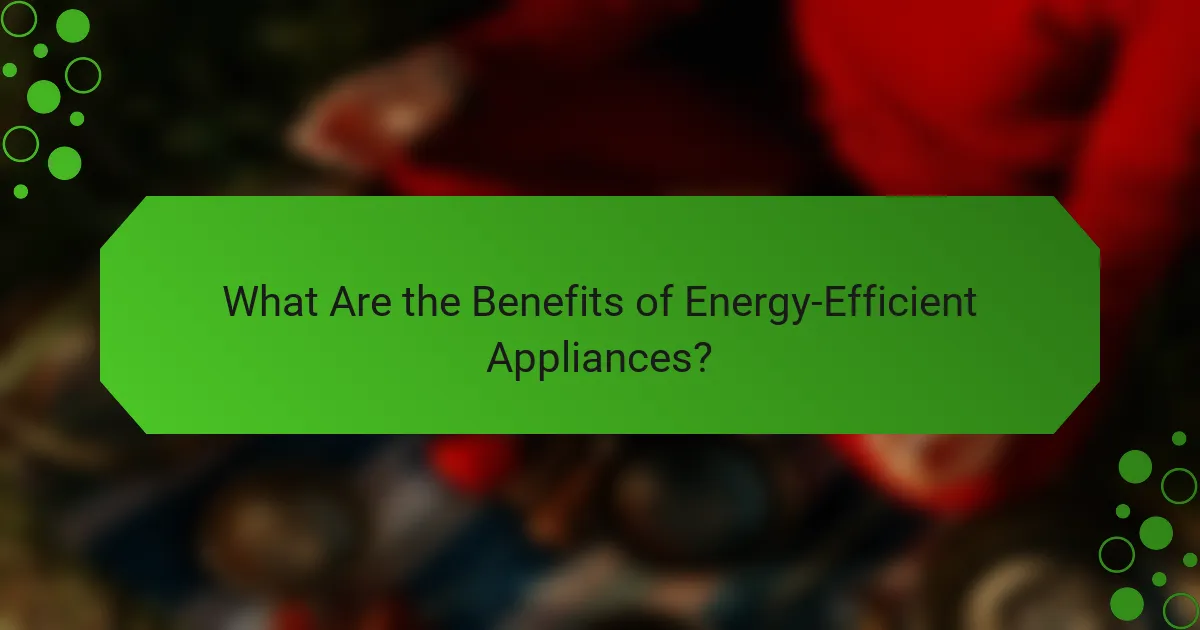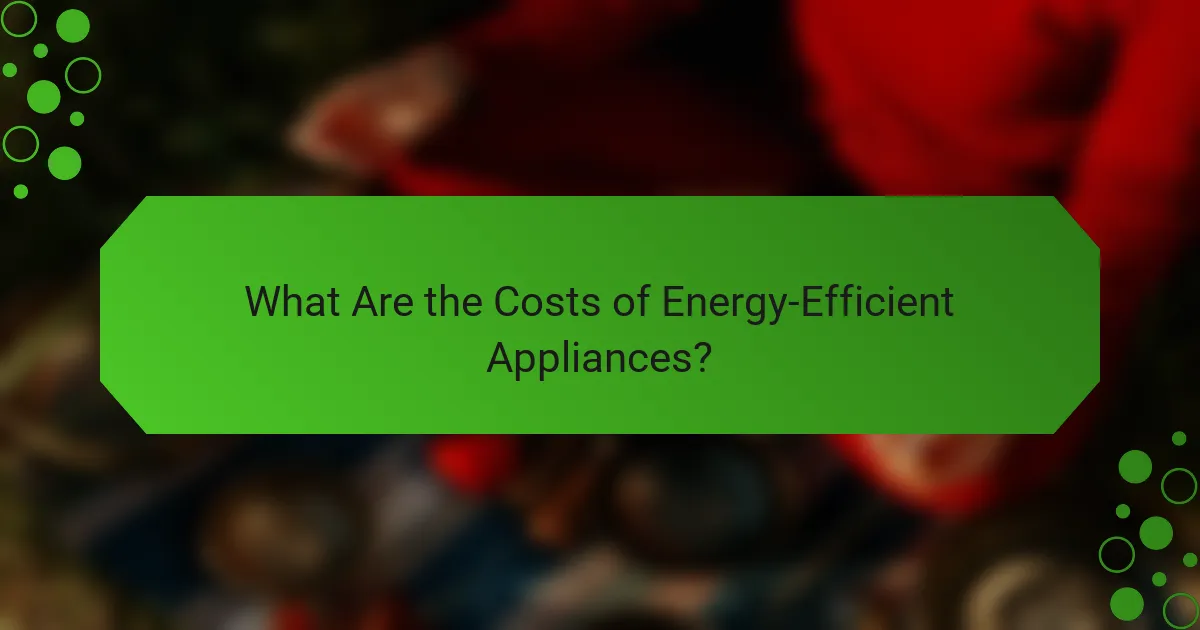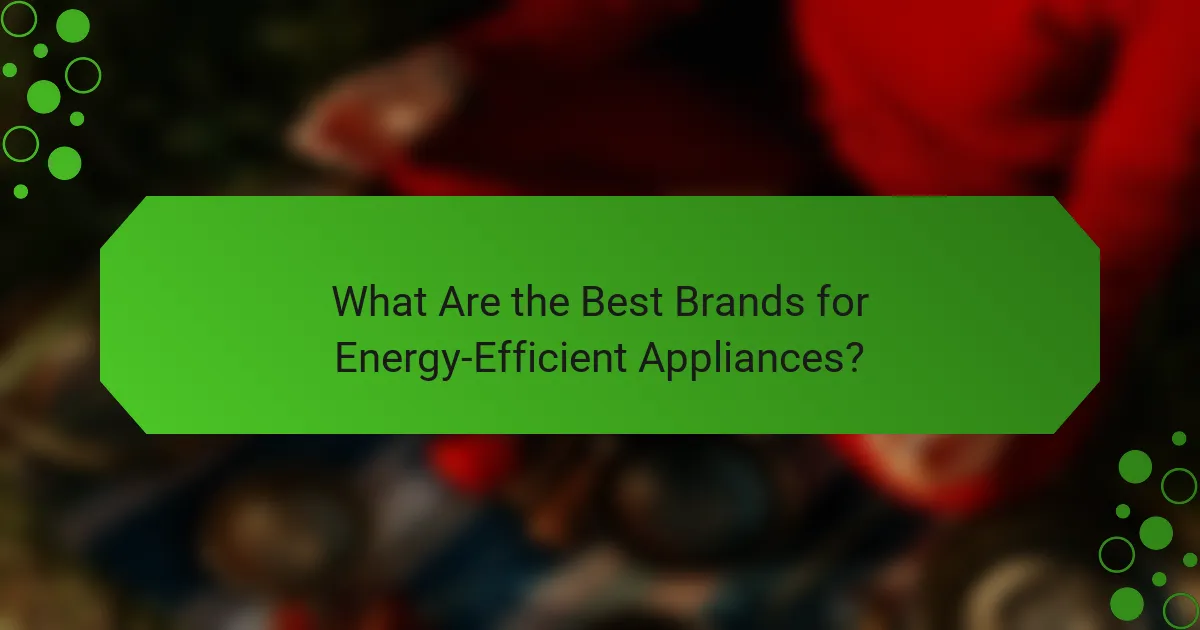Energy-efficient appliances are designed to minimize energy consumption while delivering optimal performance, making them a smart choice for both your wallet and the environment. By selecting models with high energy ratings, such as ENERGY STAR certified products, you can enjoy substantial savings on utility bills and contribute to a more sustainable future.

What Are the Best Energy-Efficient Appliances?
The best energy-efficient appliances are those that significantly reduce energy consumption while maintaining performance. Look for models with high energy ratings, such as ENERGY STAR certifications, which indicate compliance with strict energy efficiency guidelines.
Refrigerators
Energy-efficient refrigerators use advanced technology to minimize electricity usage while keeping food fresh. Look for models with features like variable speed compressors and improved insulation, which can lead to savings of 20-30% compared to older units.
When selecting a refrigerator, consider its size and layout to match your household needs. A model with a top freezer typically consumes less energy than a side-by-side model.
Washing Machines
Energy-efficient washing machines are designed to use less water and electricity. Front-loading machines generally consume less energy than top-loading ones, often saving 30-50% on energy costs.
Choose a model with a high energy rating and consider features like load sensing, which adjusts water levels based on the size of the load. This can further enhance efficiency and reduce utility bills.
Dishwashers
Modern energy-efficient dishwashers are engineered to use less water and energy while delivering effective cleaning. Look for models that use less than 3 gallons per cycle, which can save you significant amounts on your water bill.
Features such as soil sensors and energy-saving modes can optimize performance and efficiency. Running the dishwasher during off-peak hours can also help reduce costs.
Air Conditioners
Energy-efficient air conditioners provide effective cooling with lower energy consumption. Look for units with a high Seasonal Energy Efficiency Ratio (SEER) rating, as these can be 20-50% more efficient than older models.
Consider the size of the unit relative to your space; an oversized unit can lead to higher energy costs due to frequent cycling. Regular maintenance, like cleaning filters, can also enhance efficiency.
Water Heaters
Energy-efficient water heaters, particularly tankless models, heat water on demand, reducing energy waste. These units can be 20-30% more efficient than traditional tank water heaters.
When selecting a water heater, consider your household’s hot water needs and the energy source available, such as electricity or gas. Insulating pipes and using timers can further improve efficiency and reduce costs.

How Do Energy-Efficient Appliances Save Money?
Energy-efficient appliances save money primarily by reducing energy consumption, which lowers utility bills over time. By using advanced technology, these appliances operate more efficiently, leading to significant cost savings on electricity and water usage.
Lower Utility Bills
One of the most immediate benefits of energy-efficient appliances is their ability to lower utility bills. These appliances typically consume less electricity and water compared to standard models, translating to savings that can range from 10% to 50% on monthly bills. For example, an energy-efficient refrigerator can save a household around $100 annually on energy costs.
To maximize savings, consider appliances with the ENERGY STAR label, which indicates they meet strict energy efficiency guidelines set by the U.S. Environmental Protection Agency. Regular maintenance, such as cleaning filters and coils, can further enhance efficiency and savings.
Tax Incentives
Many governments offer tax incentives for purchasing energy-efficient appliances, providing additional financial benefits. In the U.S., for instance, homeowners may qualify for tax credits when they buy qualifying appliances, which can offset the initial purchase cost. These incentives vary by state and can change annually, so it’s essential to check local regulations for current offerings.
Additionally, some utility companies provide rebates for energy-efficient appliance purchases. Researching these programs can lead to significant savings, making the upfront investment more manageable.
Longer Lifespan
Energy-efficient appliances often have a longer lifespan than their less efficient counterparts, which contributes to overall cost savings. While the initial purchase price may be higher, the durability of these appliances means fewer replacements over time. For instance, an energy-efficient washing machine can last up to 15 years, compared to 10 years for a standard model.
Investing in appliances with better energy efficiency ratings can reduce the frequency of repairs and replacements, ultimately saving money in the long run. It’s wise to consider the total cost of ownership, including maintenance and replacement costs, when selecting appliances.

What Are the Benefits of Energy-Efficient Appliances?
Energy-efficient appliances offer significant advantages, including lower utility bills, reduced environmental impact, and enhanced performance. By using less energy, these appliances not only save money but also contribute to a more sustainable future.
Environmental Impact
Energy-efficient appliances help decrease greenhouse gas emissions by consuming less electricity, which often comes from fossil fuels. This reduction in energy use contributes to a smaller carbon footprint, making a positive impact on climate change.
Many energy-efficient appliances meet strict standards set by organizations like ENERGY STAR, which ensures they use at least 10-50% less energy than their conventional counterparts. Choosing these appliances can significantly reduce your household’s overall energy consumption.
Improved Performance
Energy-efficient appliances are designed to perform better while using less energy. For instance, modern refrigerators maintain optimal cooling with advanced insulation and compressors, resulting in fresher food and lower spoilage rates.
Additionally, many energy-efficient models operate more quietly and have features that enhance user convenience, such as smart technology that allows for remote monitoring and control. This improved performance can lead to a better overall user experience.
Increased Home Value
Installing energy-efficient appliances can increase the resale value of your home. Potential buyers are often willing to pay more for homes equipped with modern, energy-saving features, as they recognize the long-term savings on utility bills.
Moreover, homes with energy-efficient appliances may qualify for various incentives or rebates, further enhancing their market appeal. Investing in these appliances not only benefits your wallet but also makes your property more attractive to future buyers.

How to Choose Energy-Efficient Appliances?
Choosing energy-efficient appliances involves evaluating their energy consumption, features, and overall performance. Focus on key indicators like energy ratings, size, and brand reputation to make informed decisions that align with your needs and budget.
Energy Star Ratings
Energy Star ratings are a reliable benchmark for energy-efficient appliances. Appliances that meet these standards typically use 10-50% less energy than their conventional counterparts, leading to significant savings on utility bills.
When selecting an appliance, look for the Energy Star label, which indicates compliance with strict efficiency guidelines set by the U.S. Environmental Protection Agency. This label can help you compare similar products easily.
Size and Capacity
Choosing the right size and capacity is crucial for maximizing energy efficiency. An appliance that is too large for your needs will waste energy, while one that is too small may not perform effectively.
Consider your household size and typical usage when selecting appliances. For example, a family of four may benefit from a larger refrigerator or washing machine, while a single person might opt for a compact model to save energy and space.
Brand Reputation
Brand reputation plays a significant role in the reliability and efficiency of appliances. Established brands often invest in research and development to create energy-efficient products that last longer and perform better.
Research customer reviews and expert ratings to gauge the performance of different brands. Look for companies with a strong track record in energy efficiency and customer satisfaction to ensure you make a wise investment.

What Are the Costs of Energy-Efficient Appliances?
The costs of energy-efficient appliances encompass both their initial purchase price and the long-term savings they can generate. While these appliances may have a higher upfront cost, they often lead to significant savings on energy bills over time.
Initial Purchase Price
The initial purchase price of energy-efficient appliances can be higher than that of standard models. For instance, an energy-efficient refrigerator might cost 10-30% more than a conventional one. However, this price difference can be offset by the savings in energy costs over the appliance’s lifespan.
When shopping, look for appliances with the ENERGY STAR label, which signifies compliance with energy efficiency guidelines set by the U.S. Environmental Protection Agency. This label can help you identify models that provide better performance at a reasonable price.
Long-Term Savings
Energy-efficient appliances typically result in lower utility bills, contributing to long-term savings. For example, an energy-efficient washing machine can save you approximately $50 to $100 annually in energy and water costs compared to a standard model.
Over the lifespan of the appliance, which can be 10-15 years, these savings can accumulate significantly, often amounting to hundreds of dollars. Additionally, many energy-efficient appliances come with warranties that can further enhance their value by reducing repair costs.
Financing Options
Many retailers and manufacturers offer financing options for energy-efficient appliances, making them more accessible. Look for promotional financing plans that allow you to pay over time without incurring high-interest rates.
Additionally, some local governments and utility companies provide rebates or incentives for purchasing energy-efficient appliances. Research available programs in your area to maximize savings and potentially reduce the upfront cost significantly.

What Are the Best Brands for Energy-Efficient Appliances?
Some of the best brands for energy-efficient appliances include Energy Star certified manufacturers like Whirlpool, LG, Samsung, and Bosch. These brands are recognized for their commitment to producing appliances that consume less energy while maintaining high performance and reliability.
Top Energy-Efficient Appliance Brands
When selecting energy-efficient appliances, consider brands that consistently receive high ratings for efficiency and performance. Whirlpool and LG are often praised for their refrigerators and washing machines, while Bosch is known for its dishwashers. Samsung also offers a range of energy-efficient models that combine modern technology with energy savings.
Key Features to Look For
Look for appliances with the Energy Star label, which indicates they meet strict energy efficiency guidelines set by the U.S. Environmental Protection Agency. Features such as inverter technology, smart sensors, and eco modes can significantly enhance energy savings. Additionally, consider the appliance’s size and capacity, as larger models may consume more energy if not properly sized for your needs.
Cost Considerations
While energy-efficient appliances may have a higher upfront cost, they typically offer savings on energy bills over time. For example, an energy-efficient refrigerator can save you around 10-50 USD annually on electricity. It’s important to calculate the total cost of ownership, including purchase price, energy savings, and potential rebates, to determine the best value.
